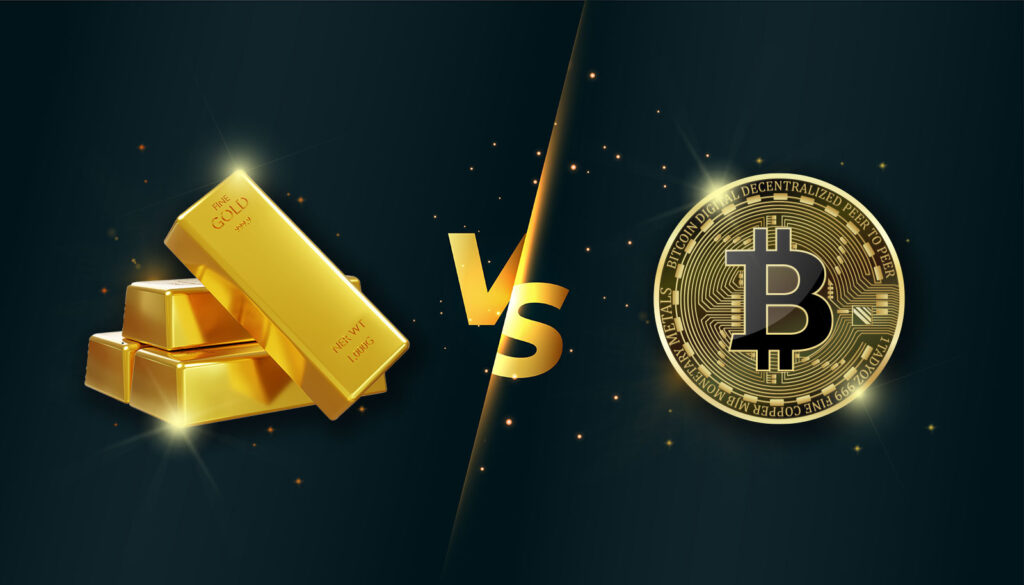The Quest For Safe Haven Solutions
With gold hitting all-time highs and the dollar’s value declining steadily, investors are actively seeking safe havens to protect their hard-earned wealth. Gold has long filled this role, but the emergence of cryptocurrencies like Bitcoin has raised questions about what constitutes a true store of value. This comparison delves into the fundamental differences between gold and Bitcoin, exploring their potential as long-term assets that can preserve wealth and provide stability amidst market fluctuations.
Gold: A Time-Tested Store of Value

Gold vs Bitcoin… which one to invest in?
Gold has a long history of serving as a store of value, enduring economic cycles and retaining its purchasing power over centuries. Despite being perceived as less exciting than cryptocurrencies due to its gradual price movements, gold has consistently provided protection against inflation and currency devaluation.
Bitcoin: A Speculative Asset Without Intrinsic Value
Bitcoin, on the other hand, has gained attention for its meteoric price rise and potential for high returns.
Gold, as a precious metal, possesses inherent strengths that distinguish it from digital assets like Bitcoin. Let’s delve deeper into these strengths, exploring various aspects that make gold a unique and valuable investment.
Key Differences: Gold Vs. Bitcoin as an investment
- Tangible Asset: Gold’s Physical Presence
Gold’s physical nature sets it apart as a tangible asset that investors can physically hold and store. Unlike digital assets like Bitcoin, which exist purely in digital form, gold provides a sense of security and ownership due to its physical presence. Investors can purchase physical gold in various forms, including bars, coins, and jewelry, and store them in secure facilities or personal safes. This tangible quality is highly valued by investors who prefer assets they can touch and see, adding a layer of trust and reassurance.
- Timeless Store of Value: Gold’s Enduring Appeal
One of gold’s most significant strengths is its enduring appeal as a store of value. Throughout history, gold has been treasured for its beauty, rarity, and intrinsic worth. It has been used in jewelry, decorative arts, and as a medium of exchange in various civilizations. Unlike Bitcoin, which lacks tangible backing and relies on digital networks, gold’s value is grounded in real-world use cases and historical significance. This enduring appeal makes gold a reliable store of wealth, providing stability and long-term value preservation for investors.
- Global Acceptance: Universally Recognized Value
Gold enjoys universal recognition and acceptance across cultures and nations. Its status as a global currency and store of value has been established over millennia, making it highly liquid and easily tradable. Gold is accepted and valued in international trade, financial markets, and investment portfolios worldwide. This universal acceptance contributes to its liquidity, ensuring that investors can easily convert gold into cash or other assets when needed.
- Stable Investment: Gold’s Resilience to Market Volatility
Gold’s price stability is another key strength, especially during times of economic uncertainty and market volatility. Unlike Bitcoin, which experiences significant price swings and volatility, gold maintains a relatively stable price trajectory over time. This stability makes gold an attractive investment option for risk-averse investors seeking to protect their wealth from market fluctuations, inflation, and geopolitical tensions. Gold’s historical track record of maintaining value during turbulent economic periods reinforces its status as a stable investment choice.
- Diverse Usage: Gold’s Practical Applications
Beyond being a store of wealth, gold has practical applications across various industries, adding to its intrinsic worth. For example, gold is widely used in jewelry for its beauty, durability, and rarity. In electronics, gold’s conductivity properties are essential for manufacturing circuitry and components. Aerospace industries utilize gold in critical components due to its corrosion resistance and high conductivity. Additionally, gold’s biocompatibility makes it valuable in medical devices and treatments. These diverse applications showcase gold’s versatility and long-term relevance in different sectors, highlighting its practical value beyond its monetary worth. While there are many on both sides of this argument, we would like to present to you one of the world’s most popular gold bugs and crypto skeptics currently in this space. Only time will truly tell, but presenting you with the risks involved with Bitcoin when compared to gold is the point of this article. There are differences and protecting your hard earned dollars and time consuming labor is the goal of this particular article.
World Renowned Economist, Peter Schiff, offers further warnings about Bitcoin being compared to Gold Debunking the “Electronic Gold” Myth
Renowned economist and cryptocurrency critic Peter Schiff has been vocal about his skepticism regarding Bitcoin’s status as a store of value. He argues that Bitcoin’s portrayal as “Electronic Gold” is misleading and lacks substance compared to physical assets like gold. According to Schiff, “In reality, Bitcoin and gold have absolutely nothing in common.”
Peter Schiff’s Critique of Bitcoin: A Deeper Look
His insights shed light on the fundamental differences between Bitcoin and traditional assets like gold.
“Bitcoin and Gold Have Nothing in Common“ Schiff’s assertion that “In reality, Bitcoin and gold have absolutely nothing in common” highlights the contrasting nature of these assets. While gold has tangible properties and real-world applications, Bitcoin exists purely as a digital entity.
“Bitcoin’s Misleading Marketing as “Digital Gold“ Schiff criticizes the marketing of Bitcoin as akin to gold, stating, “Bitcoin is marketed like gold but doesn’t possess any of the ‘metallic properties’ that give gold value.” This critique challenges the perception of Bitcoin as a substitute for physical assets like gold.
“The Fallacy of “Digital Gold“ Schiff identifies a marketing fallacy in portraying Bitcoin as “gold 2.0, digital gold.” He emphasizes, “Bitcoin itself is always displayed as a coin, and the color is gold, and you put like a ‘B’ on it. But it’s not a coin; it’s just a digital string of numbers; it doesn’t have any substance.” This critique questions the intrinsic value of cryptocurrencies compared to tangible assets like gold.
“Lack of Real-World Use Cases for Bitcoin” Schiff points out the difference between “price and value,” noting that gold’s value is derived from real-world applications. He contrasts this with Bitcoin, which lacks tangible backing in the real world. Schiff’s critique underscores the importance of assets with practical utility beyond speculative trading.
“Long-Term Viability: Gold vs. Bitcoin” Schiff highlights the enduring value of gold over time, contrasting it with the uncertainty surrounding Bitcoin’s future. He envisions a scenario where “The gold that I’m storing today can be melted down and used in electronics or used in jewelry,” emphasizing gold’s practicality and lasting relevance compared to Bitcoin.
Peter Schiff’s insights provide a critical perspective on Bitcoin’s role as a store of value, emphasizing the tangible qualities and real-world utility that differentiate gold from digital assets like Bitcoin.
Gold not only possesses properties that Bitcoin and Cryptocurrencies do not possess. It also possesses properties that no other metal possesses.
Below are the top 10 unique characteristics of Gold that make it “Precious”!
Non-Reactivity: Gold is highly resistant to corrosion, oxidation, and tarnishing. Unlike many other metals, it doesn’t rust or corrode when exposed to moisture or air, making it suitable for long-term use in various applications.
Malleability: Gold is one of the most malleable metals, meaning it can be easily hammered or pressed into thin sheets without breaking. This property allows for intricate designs in jewelry making and facilitates its use in thin coatings for electronic components.
Ductility: Similarly, gold is highly ductile, meaning it can be stretched into long wires without breaking. This property is crucial in the manufacturing of wires for electronics, where gold’s conductivity and flexibility are essential.
Excellent Conductivity: Gold is an excellent conductor of electricity and heat. Its high electrical conductivity makes it ideal for use in electronics, such as circuit boards and connectors, where reliable conductivity is necessary.
Inertness: Gold is chemically inert, meaning it does not react with most substances. This property makes it suitable for use in medical implants, as it does not cause allergic reactions or adverse effects in the body.
Biocompatibility: Gold is biocompatible and has been used in medicine for centuries. It is non-toxic to living tissues and is used in dental fillings, surgical instruments, and treatments for certain medical conditions.
Aesthetic Appeal: Gold’s luster, color, and rarity give it a unique aesthetic appeal. It has been valued for its beauty throughout history and is a preferred material for high-end jewelry and decorative arts.
Density: Gold is a dense metal, which means a small amount of gold can have significant weight. This property is advantageous in applications where weight or mass is a factor, such as in balancing instruments or adding heft to certain products.
Resistance to Acids: Gold is resistant to most acids, including hydrochloric acid and nitric acid. This resistance to chemical corrosion makes it durable in various environments and applications.
Value Retention: Gold has a long history as a store of value. Unlike other metals that may fluctuate significantly in value, gold has maintained its worth over centuries, making it a reliable investment and hedge against economic uncertainty.
The Enduring Value of Gold
In the debate between gold and Bitcoin as a storer of value, gold’s intrinsic qualities and historical track record stand out. While Bitcoin offers potential for speculative gains, its volatility and lack of tangible backing raise concerns about long-term stability. As Schiff aptly summarizes, “Gold’s value as determined by real-world use cases… [makes it] a tried and tested asset held by investors and central banks.”
As investors navigate the complex landscape of asset classes, gold remains a steadfast choice for wealth preservation and portfolio diversification. Its tangible nature, global acceptance, stability, and diverse applications solidify its position as a true store of value—a distinction that sets it apart from the speculative allure of digital currencies like Bitcoin.
Please Note: It is important to understand, this article is not meant to argue that money cannot be made with Bitcoin or any other investment. It is merely to make the point, that Bitcoin is not equal to gold as a “storer of value” and it does not contain the same properties as the yellow metal, thus should not be considered a “safe haven”, but rather an investment chosen for different reasons and objectives. Thus making gold a superior hedge against inflation and problematic times, now and far into the future.
Credits/Reference to:
Peter Schiff, President and Chief Global Strategist of Euro Pacific Capital, https://europac.com/
Peter Schiff’s Wikipedia Page & Bio – https://en.wikipedia.org/wiki/Peter_Schiff




